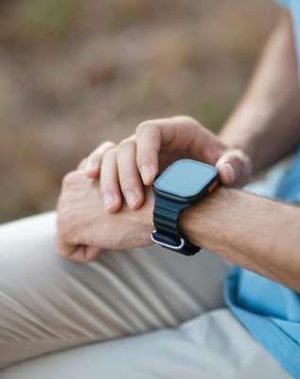Tech experts warn about hackers infiltrating smartwatches and wearable devices
By
Danielle F.
- Replies 18
In an age where technology has been intertwined with our daily lives, many of us have come to rely on our gadgets throughout the day.
From our mobile phones to the tiny smartwatches we have on our wrists, these devices have become personal assistants and help keep our tasks—and health—at bay.
However, Australian researchers recently shared that there may be a hidden cost to the convenience they bring: our privacy and security.
A study conducted by Charles Darwin University (CDU) experts revealed a startling truth about smartwatches.
These wrist-bound gadgets could be more vulnerable to cyber-attacks than our mobile phones.
The researchers tried to hack into various wearable devices priced between $25 to $150 to expose these devices' weak security systems.
Smartwatches commonly use Bluetooth Low Energy (BLE) technology.
These, in turn, extend the watches' battery life to two weeks per charge.
However, in exchange for its longevity, smart watches lose security measures.
The tested devices had 'very weak or no security defence system,' leaving them open to exploitation by tech-savvy scammers.
Scammers could use Bluetooth 'sniffing tools' to intercept and analyse data packets transmitted over phones to smartwatches.
CDU Faculty member and study supervisor Dr Bharanidharan Shanmugan explained the gravity of the situation.
Not only could they access health data on these devices—they could also manipulate it.
A hacker could alter your pulse readings, track movements, and even access sensitive medical information like blood pressure and ECG readings.
This data could then be sold to medical companies for targeted marketing or, worse, to create a comprehensive, fake profile of a user.
Stolen smartwatch data could be a tool for cybercriminals.
The possible misuse of this data could range from targeted scams and blackmail to physical harm.
'Smartwatch makers are not taking security seriously, which is a significant concern,' Dr Shanmugan said.
The consequences of data breaches could be dire, not just for individuals but also for the companies behind these devices.
Experts urged users to stay informed about the security features of any wearable technology.
Opt for devices with a strong security record.
Regularly update your phone and smart watch's software as manufacturers try to fix security vulnerabilities in real-time.
Be cautious about the permissions you grant to apps on your smartwatch, and consider using a VPN on your smartphone to keep your sensitive data safe.

Have you experienced issues with your smartwatch? Do you have tips for fellow seniors on how to stay safe in the digital age? Share your thoughts and experiences in the comments below.
From our mobile phones to the tiny smartwatches we have on our wrists, these devices have become personal assistants and help keep our tasks—and health—at bay.
However, Australian researchers recently shared that there may be a hidden cost to the convenience they bring: our privacy and security.
A study conducted by Charles Darwin University (CDU) experts revealed a startling truth about smartwatches.
These wrist-bound gadgets could be more vulnerable to cyber-attacks than our mobile phones.
The researchers tried to hack into various wearable devices priced between $25 to $150 to expose these devices' weak security systems.
Smartwatches commonly use Bluetooth Low Energy (BLE) technology.
These, in turn, extend the watches' battery life to two weeks per charge.
However, in exchange for its longevity, smart watches lose security measures.
The tested devices had 'very weak or no security defence system,' leaving them open to exploitation by tech-savvy scammers.
Scammers could use Bluetooth 'sniffing tools' to intercept and analyse data packets transmitted over phones to smartwatches.
CDU Faculty member and study supervisor Dr Bharanidharan Shanmugan explained the gravity of the situation.
Not only could they access health data on these devices—they could also manipulate it.
A hacker could alter your pulse readings, track movements, and even access sensitive medical information like blood pressure and ECG readings.
This data could then be sold to medical companies for targeted marketing or, worse, to create a comprehensive, fake profile of a user.
Stolen smartwatch data could be a tool for cybercriminals.
The possible misuse of this data could range from targeted scams and blackmail to physical harm.
'Smartwatch makers are not taking security seriously, which is a significant concern,' Dr Shanmugan said.
The consequences of data breaches could be dire, not just for individuals but also for the companies behind these devices.
Experts urged users to stay informed about the security features of any wearable technology.
Opt for devices with a strong security record.
Regularly update your phone and smart watch's software as manufacturers try to fix security vulnerabilities in real-time.
Be cautious about the permissions you grant to apps on your smartwatch, and consider using a VPN on your smartphone to keep your sensitive data safe.
Key Takeaways
- Australian researchers showed vulnerabilities in smartwatches that hackers could exploit.
- Through the use of Bluetooth' sniffing tools', researchers at Charles Darwin University accessed data on smartwatches, demonstrating how cybercriminals can manipulate vital information.
- Devices using Bluetooth Low Energy (BLE) technology have been found to have weak or no security defence systems.
- The study's supervisor highlighted the potential risks of stolen smartwatch data and emphasised the need for manufacturers to prioritise security in wearable devices.








